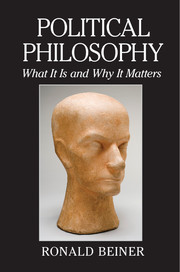Book contents
- Frontmatter
- Dedication
- Contents
- First Prologue: Horizons of Political Reflection
- Second Prologue: Freud, Weber, and Political Philosophy
- 1 Hannah Arendt: The Performativity of Politics
- 2 Michael Oakeshott: Life’s Adventure
- 3 Leo Strauss: The Politics of Philosophy
- 4 Karl Löwith: In Awe of the Cosmos
- 5 Excursus on Nature and History in the Strauss-Löwith Correspondence
- 6 Eric Voegelin: Modernity’s Vortex
- 7 Simone Weil: The Politics of the Soul
- 8 Hans-Georg Gadamer: Philosophy without Hubris
- 9 Jürgen Habermas: Politics as Rational Discourse
- 10 Michel Foucault’s Carceral Society
- 11 Alasdair MacIntyre: Fragmentation and Wholeness
- 12 Short Excursus on the Rise and Decline of Communitarianism as a Political Philosophy
- 13 John Rawls and the Death of Political Philosophy
- 14 Richard Rorty: Knocking Philosophy off Its Pedestal, or the Death of Political Philosophy Postmodernized
- Epilogue: On Not Throwing in the Towel
- Index
- References
13 - John Rawls and the Death of Political Philosophy
Published online by Cambridge University Press: 05 August 2014
- Frontmatter
- Dedication
- Contents
- First Prologue: Horizons of Political Reflection
- Second Prologue: Freud, Weber, and Political Philosophy
- 1 Hannah Arendt: The Performativity of Politics
- 2 Michael Oakeshott: Life’s Adventure
- 3 Leo Strauss: The Politics of Philosophy
- 4 Karl Löwith: In Awe of the Cosmos
- 5 Excursus on Nature and History in the Strauss-Löwith Correspondence
- 6 Eric Voegelin: Modernity’s Vortex
- 7 Simone Weil: The Politics of the Soul
- 8 Hans-Georg Gadamer: Philosophy without Hubris
- 9 Jürgen Habermas: Politics as Rational Discourse
- 10 Michel Foucault’s Carceral Society
- 11 Alasdair MacIntyre: Fragmentation and Wholeness
- 12 Short Excursus on the Rise and Decline of Communitarianism as a Political Philosophy
- 13 John Rawls and the Death of Political Philosophy
- 14 Richard Rorty: Knocking Philosophy off Its Pedestal, or the Death of Political Philosophy Postmodernized
- Epilogue: On Not Throwing in the Towel
- Index
- References
Summary
John Rawls wrote two very famous books. In what follows, I’ll discuss the second of these two books (the one first published in 1993 rather than the one first published in 1971) because in my view that is the one that has far-reaching consequences for what political philosophy as a field of intellectual endeavor is supposed to be, and that potentially puts out of business the conception of political philosophy I have sought to defend throughout this book. It seems outrageous to discuss the work of Rawls under the rubric of “the death of political philosophy.” My objective in this chapter is to defend my choice of this provocative rubric, and explain both why the key philosophical move that Rawls initiates with Political Liberalism (and the essays leading up to it) makes sense from within his own intellectual framework, and why it has quite damaging consequences for the conception of theorizing defended in this book.
Any discussion of Rawls must begin with his theory of justice, so that is where we’ll start. I don’t have the space to go into the technical details of Rawls’s theorizing, which are often quite intricate, and some of which Rawls repeatedly revised. Rather, I’ll content myself with trying to map out the broader vision that shapes both the content of Rawls’s political philosophy and his conception of what political philosophy is.
- Type
- Chapter
- Information
- Political PhilosophyWhat It Is and Why It Matters, pp. 198 - 214Publisher: Cambridge University PressPrint publication year: 2014



